Stop Picking on Public Libraries
You might think that an apparently harmless public good like a library would have no enemies. But in the age of Trump, they have many.
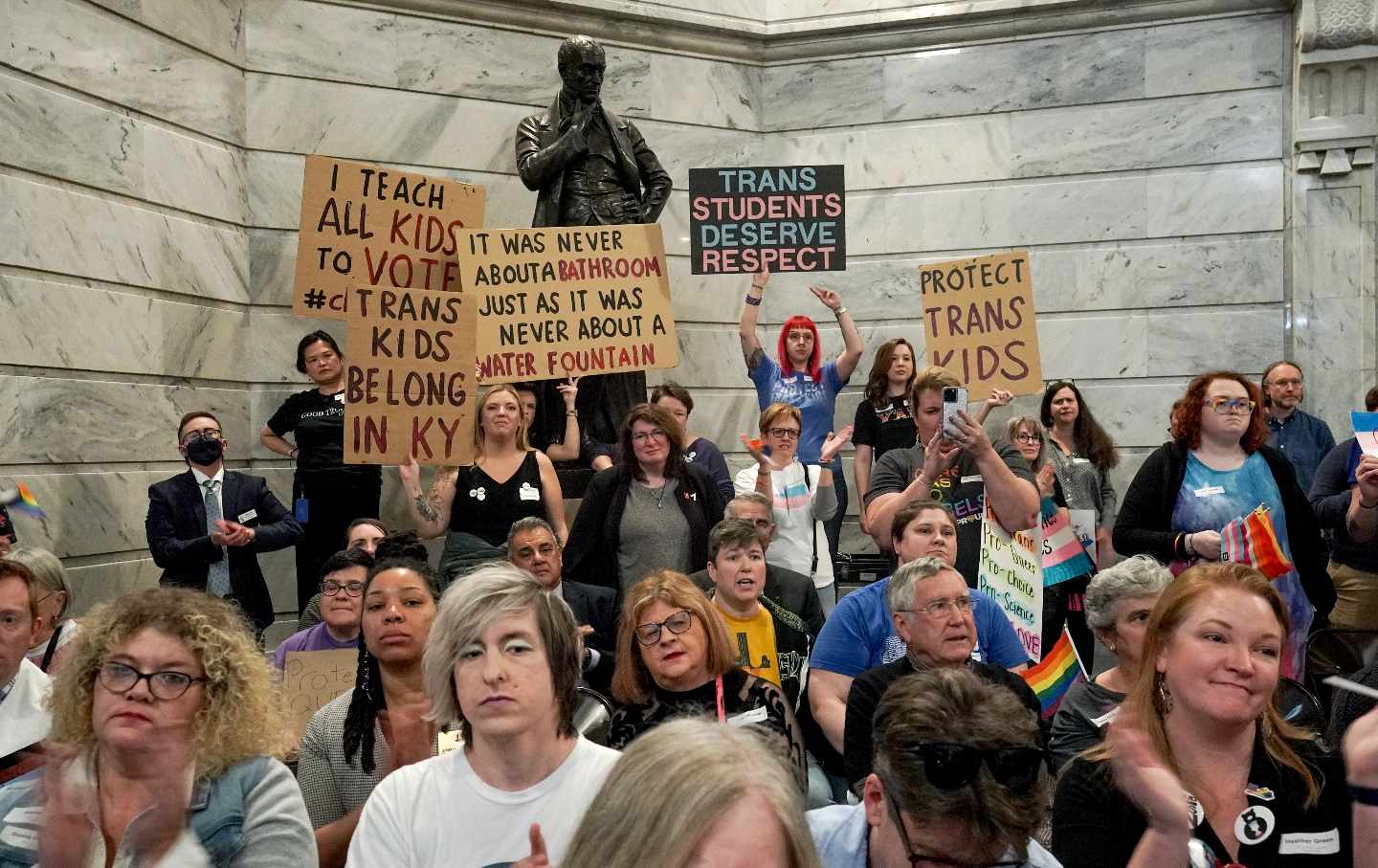
Activists in the Kentucky State Capitol protesting SB 150, which was cited by the Boyle County School District to ban more than 100 books.
(Bonnie Jo Mount / Getty)This article originally appeared at TomDispatch.com. To stay on top of important articles like these, sign up to receive the latest updates from TomDispatch.com.
When my mother died in 2000, I inherited all her books. Sadly, after several moves and downsizings over the decades, her collection had shrunk. Still, it remains considerable and impressive in its own way. Her legacy to me included some special volumes like a first edition of Frederick W. Taylor’s The Principles of Scientific Management, a famed codification of time-management practices and an origin point for concepts that helped shape work in the last century—and this one, too.
Oh, and there’s also a first American edition of E.M. Forster’s novel Howards End. On the flyleaf, she inscribed this note: “Stolen by Suzanne Gordon.” As the bookplate on the cover’s interior indicates, it was indeed stolen from (or at least never returned to) The Free Library of Philadelphia. When did this bit of larceny occur? It would certainly have been after she married my dad in 1949, when she acquired his surname Gordon, so probably sometime in the 1950s. The good news is that the Philadelphia library still has several copies of Forster’s book on its shelves today, along with audio books and film DVDs of the work. The bad news is that it’s among the many books on the American Library Association’s list of most frequently banned classics.
Of course, the all-American penchant for banning books didn’t begin in the Trump era. Just ask almost anyone who lived through the Red Scare days of the 1950s (not to speak of the first Red Scare of 1917–20). But the last few years have seen a remarkable acceleration of attempts to keep certain books off the shelves of public and school libraries. The American Library Association reports an almost four-fold increase in the number of banning attempts between 2003 (458) and 2022 (1,269), most of that increase coming between 2020 and 2022. That this new passion for book banning coincides with the rise of Donald J. Trump, MAGA Republicanism, and Florida Governor Ron DeSantis’s failed “anti-woke” presidential campaign is no accident.
The Most Benign Institution
Name any public institution—the US military, say, or a county welfare office—and it’s bound to have its negative aspects. Maybe you appreciate that the military is one of the most racially integrated bodies in the country. At the same time, perhaps you’re distressed by its recent turn to US universities as a locus for the development of AI-powered autonomous lethal weaponry. Perhaps you appreciate that your county welfare office helps people get access to benefits they’re entitled to like SNAP (formerly food stamps) and health insurance. At the same time, you may not admire the mental and emotional burden the welfare system places on people working to secure those benefits or the racial animus and disrespect they may encounter in the process.
I’d like to argue that there is, however, one institution that’s almost entirely benign: the public library. As I wish one could say about our medical system, it does no harm (though many right-wingers disagree with me, as we shall see).
What could be more wonderful than a place that allows people to read books, magazines, and newspapers for free? That encourages children to read? That these days offers free access to that essential source of information, entertainment, and human connection, the Internet? It’s even a place where people who have nowhere to live—or who are regularly kicked out of their homeless shelters during daylight hours—can stay dry and warm. And where they, too, can read whatever they choose and, without spending a cent—no small thing—use a bathroom with dignity.
Free public libraries first appeared in this country in the late 1700s or early 1800s, depending on how you parse that institution’s defining characteristics. It’s generally agreed, however, that the first dedicated, municipally funded public library in the world opened in 1833 in Peterborough, N.H. A century earlier, Benjamin Franklin had founded the Philadelphia Library Company, a private, subscription-based outfit, funded by members who paid annual dues.
While members of such libraries would indeed pay annual dues or even buy shares in them, circulating libraries—some operated by publishing companies, others as stand-alone profit-making businesses—charged the public rent on specific volumes. At a time when books were very expensive, circulating libraries made them available to people who couldn’t afford to own the ones they wanted to read. Such libraries were especially attractive to female readers, the main audience for the expanding universe of fiction in the eighteenth and nineteenth centuries.
Private-Public Partnerships
I’m lucky to live less than a block from a branch library located in a classical-style two-story stone building. With almost floor-to-ceiling deep-set windows, thick walls, and a hushed interior, the Mission branch of the San Francisco Public Library is an island of peace in the choppy waters of my vibrant neighborhood. In many ways, the Mission is contested territory. Here, the children and grandchildren of Latin American immigrants compete for cultural and commercial space with a new group of migrants—the tech workers who love the Mission District for its edginess, but whose comparatively high earnings are pushing up rents for older residents and, in the process, sanding off some of those edges.
Still, the library serves us all without fail. It has children’s story hours, a bank of Internet-connected computers, and shelves and shelves of books, including a substantial selection of titles in Spanish. Many mornings, I see snaking lines of tiny kids waiting for the library to open so they can listen to stories and exchange last week’s books for a new selection.
Public branch libraries as we know them might never have existed if it weren’t for the munificence of a single obscenely rich private donor. Like more than 2,500 others built worldwide, my branch is a Carnegie library. It was constructed in 1916 with funds provided by the Scottish-American robber baron and steel magnate Andrew Carnegie. Like every community seeking Carnegie money, San Francisco had to satisfy his specific requirements. It had to demonstrate the need for a public library. It also had to guarantee that it would provide an appropriate building site, salaries for a professional staff, operating funds once it was open, services for free, and (perhaps most importantly) use public money (in addition to any private donations) to support the library. Carnegie believed that communities would only value and maintain their libraries if they were collectively supported by taxpayers. He also thought that libraries belonged in local neighborhoods where potential readers would have easy access to them, so early on he stopped funding the main libraries in cities in favor of neighborhood branches.
Almost 1,700 of these, along with about 100 university libraries, were built in the United States with his money between 1886 and 1929. He also funded them around the world from Canada and Great Britain to Mauritius, Fiji, and New Zealand, among other places. In the Jim Crow South, Carnegie did nothing to oppose racial segregation but did at least apply the same approach and standards to the construction of libraries in Black neighborhoods of segregated cities as in white ones.
In an age when today’s robber barons are investing their money in fantasies of personal survival, whether through cryogenic freezing or riding out climate change in luxurious private bunkers in New Zealand or Hawaii, it’s hard not to have a certain nostalgia for Carnegie’s brand of largesse. I don’t know whether Peter Thiel’s New Zealand “apocalypse insurance” redoubt will still be there a century from now, but my library is already more than 100 years old and I wouldn’t be surprised if it were still offering whatever the equivalent of books might be, assuming no ultimate apocalypse has occurred, 100 years from now.
Popular
“swipe left below to view more authors”Swipe →Threatening the Benign Institution
You might think that an apparently harmless public good like a library would have no enemies. But in the age of Trump and his movement to Make America Grotesque Again, there turn out to be many. Some are “astroturf” outfits like the not-even-a-little-bit-ironically named Moms for Liberty. M4L, as they abbreviate their name, was founded in 2021 in Florida, originally to challenge Covid-era mask mandates in public schools. They’ve since expanded their definition of “liberty” to include pursuing the creation of public school libraries that are free of any mention of the existence of LGBTQ people, gender variations, sex, or racism. In effect, the freedom they are seeking is liberation from the real world.
You won’t be surprised to learn that M4L supported Florida Governor Ron DeSantis’s 2022 and 2023 “Don’t Say Gay” laws, which outlaw any discussion of sexual orientation or gender identity in public schools, while making it extremely easy for parents or other citizens to demand the removal of books they find objectionable from school libraries. Copycat laws have since been passed in multiple states, including Tennessee where a school district banned MAUS, the best-selling Pulitzer Prize–winning graphic novel about the Holocaust, from its curriculum, thanks to eight now-forbidden words and a drawing of a naked mouse. (In doing so, it also drove the book back onto national bestseller lists.)
One Florida school district chose to play it especially safe, not limiting itself to removing commonly banned books like Push by Sapphire, the 1970s anti-drug classic Go Ask Alice, and Ann Frank’s Diary of a Young Girl. According to CBS News, “Also on the list are ‘Merriam-Webster’s Elementary Dictionary,’ ‘The Bible Book,’ ‘The World Book Encyclopedia of People and Places,’ ‘Guinness Book of World Records, 2000,’ ‘Webster’s Dictionary and Thesaurus for Students,’ and ‘The American Heritage Children’s Dictionary.’” I guess the book banners don’t want to risk kids encountering any words they disapprove of in a dictionary.
Contemporary book-banning efforts extend beyond school libraries, where reasonable people might differ (a little!) about what books should be available to children, to public libraries, where book banners seek to keep even adults from reading whatever we choose. EveryLibrary, an anti-censorship organization, keeps a running total of active “legislation of concern” in state legislatures that relates to controlling libraries and librarians. They maintain a continually updated list of such bills (the number of active ones changed just as I was exploring their online list). As of today, they highlight 93 pieces of legislation moving through legislatures in 24 states as varied as Idaho and Rhode Island.
In 2024, they are focusing on a number of key issues, including “bills that would criminalize libraries, education, and museums (and/or the employees therein) by removing long-standing defense from prosecution exemptions under obscenity laws and/or expose librarians to civil penalties.” In addition to protecting libraries and their employees from criminal prosecution for stocking the “wrong” books, they are focusing on potential legislation that could restrict the freedom of libraries to develop their collections as they wish, as well as bills that would defund or close public libraries altogether. Sadly, as those 93 active bills indicate, in all too many states, libraries are desperately under attack.
Legislation pending in Oklahoma offers an interesting example of the kinds of bills moving through statehouses around the country. The proposed “Opposition to Marxism and Defense of Oklahoma Children Act of 2024,” unlike some bills in other states, is not concerned with excising specific offerings from Oklahoma’s library shelves. Rather, it focuses on a key organization, the American Library Association (ALA), which, since 1876, has existed to promote and support librarians. One of the ALA’s most important activities is the accreditation of library schools, where future librarians study their craft.
Oklahoma’s “Opposition to Marxism Act” would outlaw all cooperation with the ALA, including a previously existing requirement that public librarians have degrees from ALA-accredited library schools. In this context, “opposing Marxism” means opposing the main professional organization for librarians and its Oklahoma affiliate. I imagine this has something to do with the ALA’s support for “Equity, Diversity, and Inclusion,” which any MAGA adherent will assure you is just another code word for Marxism.
Like Mother Like Daughter?
I’ve loved libraries since I was a small child. I used to regularly ride my bike to our local branch and return home with a basketful of books. With my mother’s permission to borrow books from the adult section, I had the run of the place. She brooked no censorship in my reading life (although I do remember her forbidding me to see the movie West Side Story because she thought it would be too sad for me).
I seem to have inherited my mother’s regrettable tendency to hold onto library books past their due dates. Or at least I blame her for that terrifying evening when I was perhaps 10 years old and heard the doorbell ringing. My mother called me downstairs to greet the two people on our doorstep. They were probably college kids but, to me at the time, seemed all too grown-up. They were there on a mission: to reclaim seven overdue library books. Fortunately, I knew where in my messy bedroom each one could be found and was able to round them up in a few minutes.
These days, I wouldn’t be surprised if some of my overdue books reclaimed that night wouldn’t even be found on library shelves in some states. (After all, I do remember that my mother introduced me to E.M. Forster when I was still pretty young.)
The tendency to hold onto books past their due date has, alas, continued to this day. Just this morning I received an e-mail reminding me that I needed to return one that was squirreled away in my backpack. So, off I trundled to my neighborhood library, silently thanking Andrew Carnegie and the good people of San Francisco that I still have a library to go to and promising myself not to let any MAGA-minded fools take it away.
Thank you for reading The Nation!
We hope you enjoyed the story you just read, just one of the many incisive, deeply-reported articles we publish daily. Now more than ever, we need fearless journalism that shifts the needle on important issues, uncovers malfeasance and corruption, and uplifts voices and perspectives that often go unheard in mainstream media.
Throughout this critical election year and a time of media austerity and renewed campus activism and rising labor organizing, independent journalism that gets to the heart of the matter is more critical than ever before. Donate right now and help us hold the powerful accountable, shine a light on issues that would otherwise be swept under the rug, and build a more just and equitable future.
For nearly 160 years, The Nation has stood for truth, justice, and moral clarity. As a reader-supported publication, we are not beholden to the whims of advertisers or a corporate owner. But it does take financial resources to report on stories that may take weeks or months to properly investigate, thoroughly edit and fact-check articles, and get our stories into the hands of readers.
Donate today and stand with us for a better future. Thank you for being a supporter of independent journalism.
Thank you for your generosity.
More from The Nation
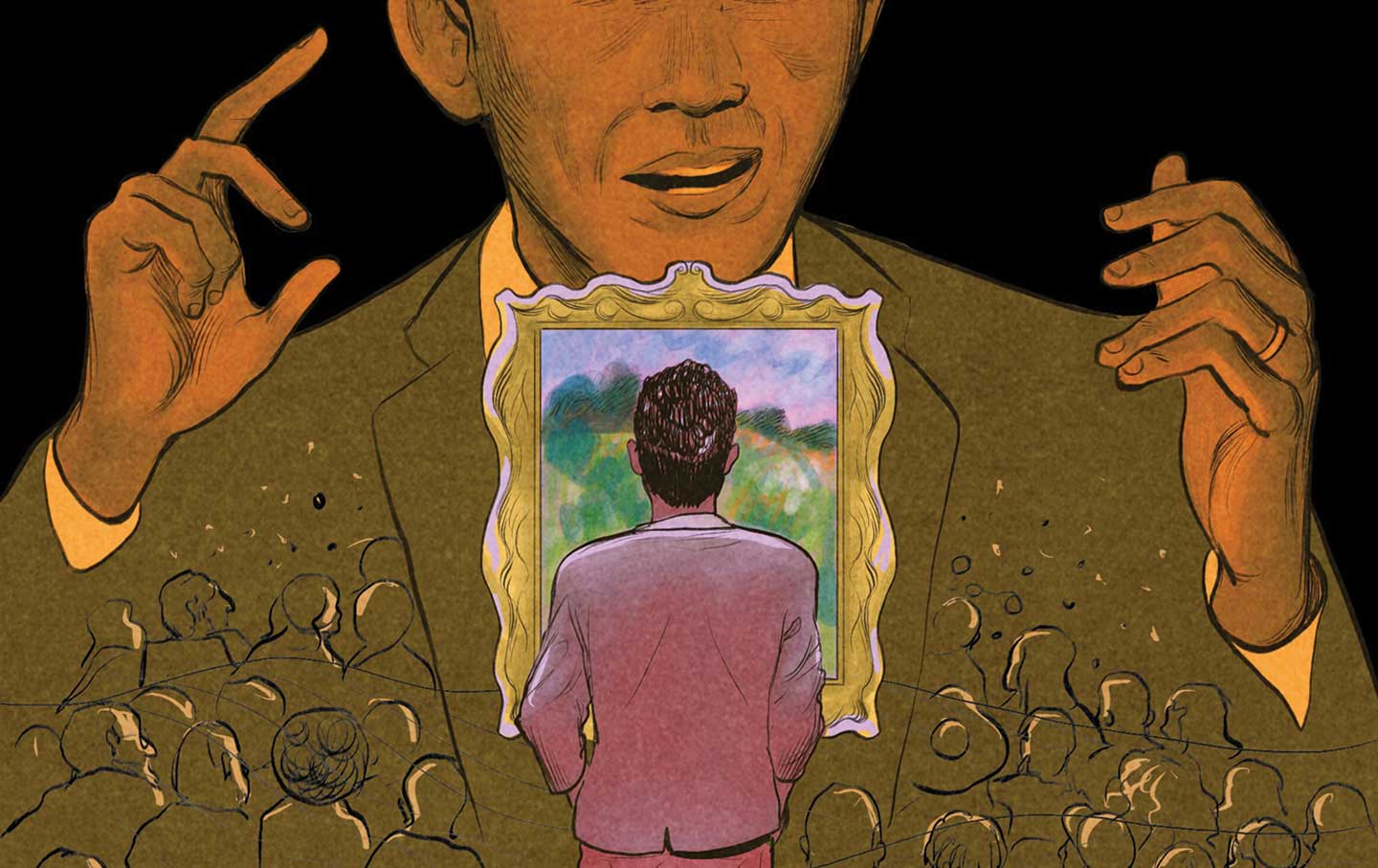
Vinson Cunningham’s Searching Novel of Faith and Politics Vinson Cunningham’s Searching Novel of Faith and Politics
In Great Expectations, Cunningham examines the hope and aspirations of the Obama generation.

Keith Haring and the Downtown Art Revolution Keith Haring and the Downtown Art Revolution
A new biography tells the story of not only Haring’s life but also the exhilarating world of New York art in the 1970s and 80s.

Macklemore Dares Others to Stand Up for Palestine Macklemore Dares Others to Stand Up for Palestine
With “Hind’s Hall,” the rapper is telling artists and other culture workers, “The students are risking it all. Where are you?”
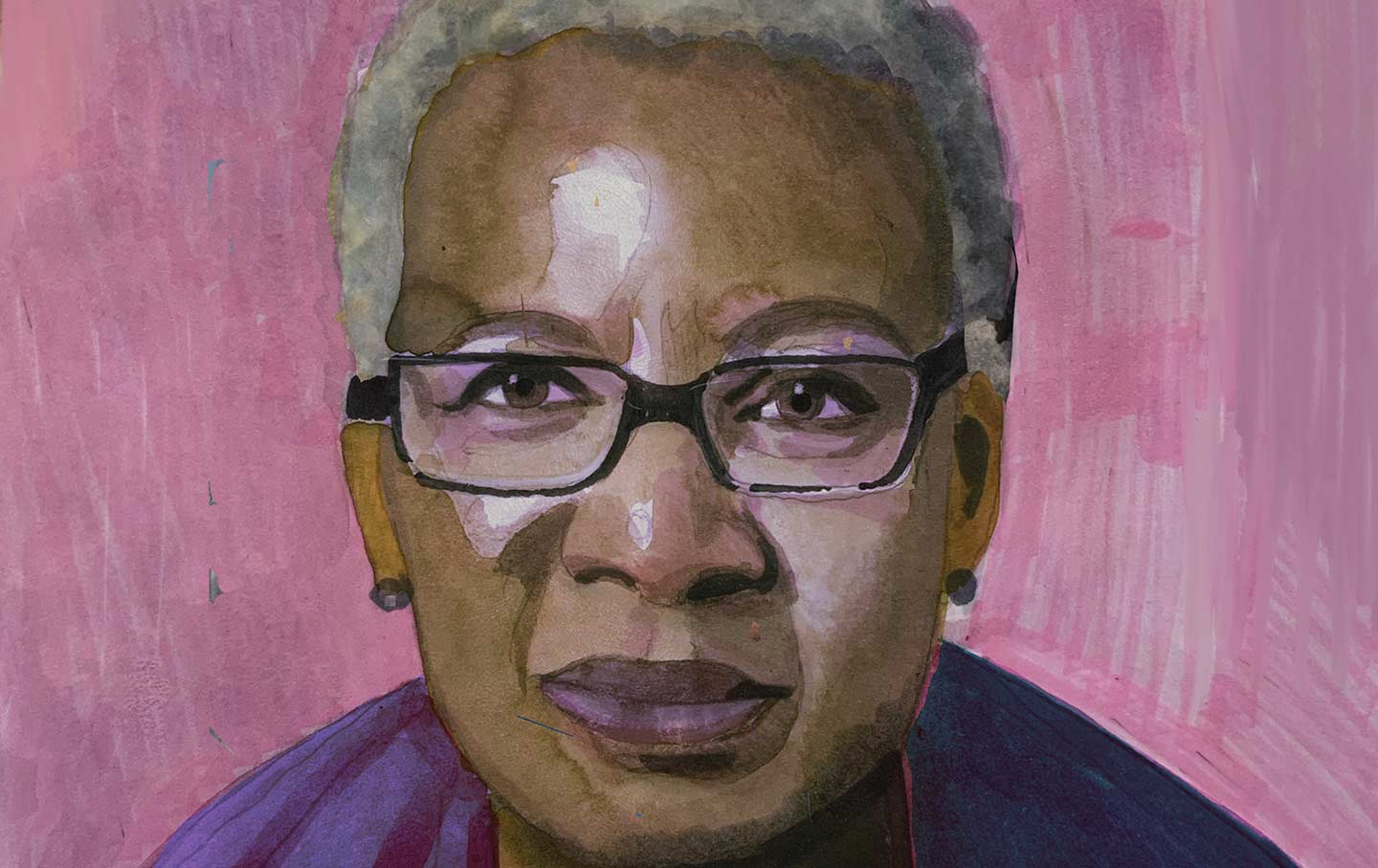
Nell Irvin Painter’s Chronicles of Freedom Nell Irvin Painter’s Chronicles of Freedom
A new career-spanning book offers a portrait of Painter’s career as a historian, essayist, and most recently visual artist.
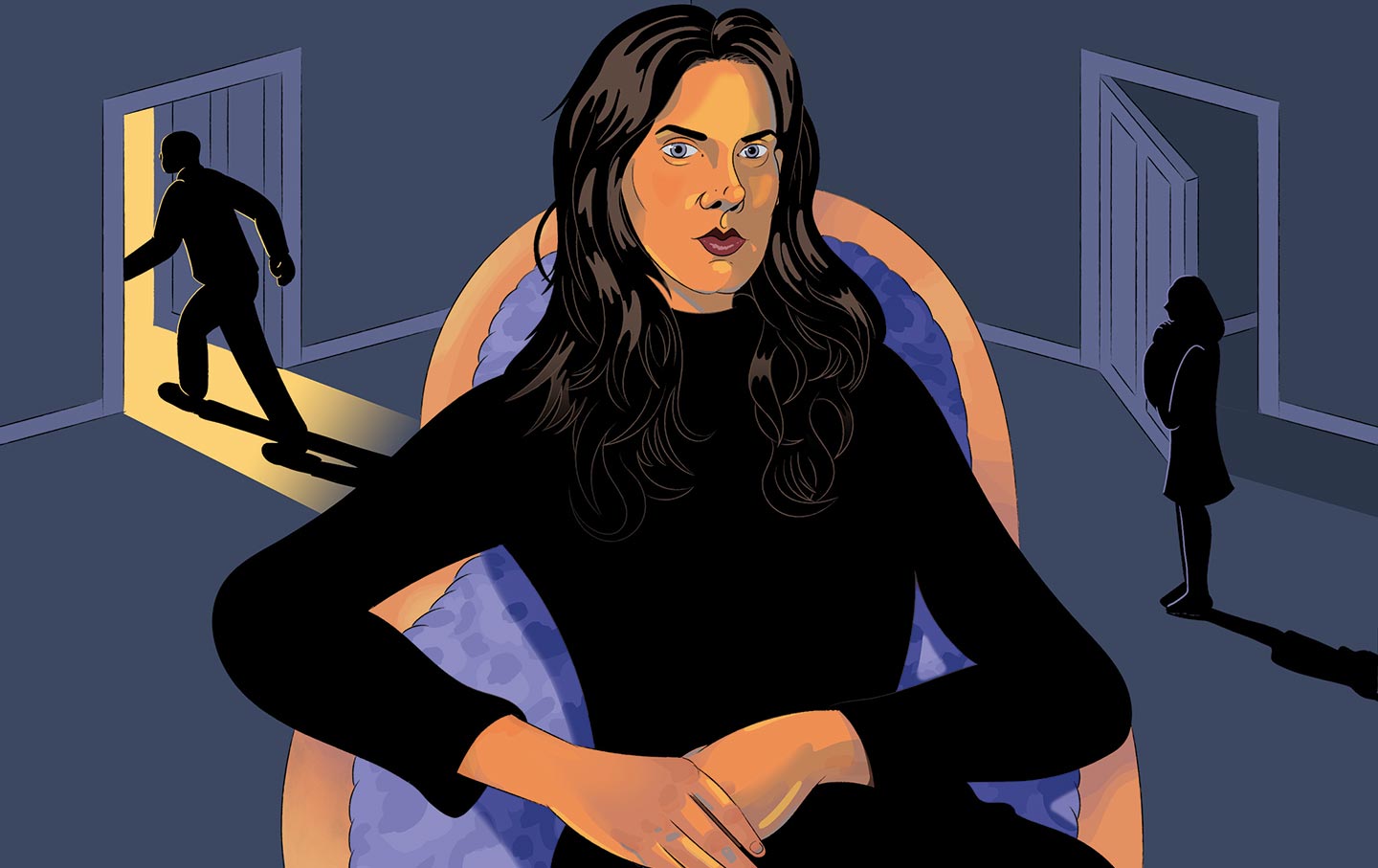
Leslie Jamison and the Travails of Millennial Divorce Leslie Jamison and the Travails of Millennial Divorce
In her new book, the novelist and essayist examines life before and after marriage.
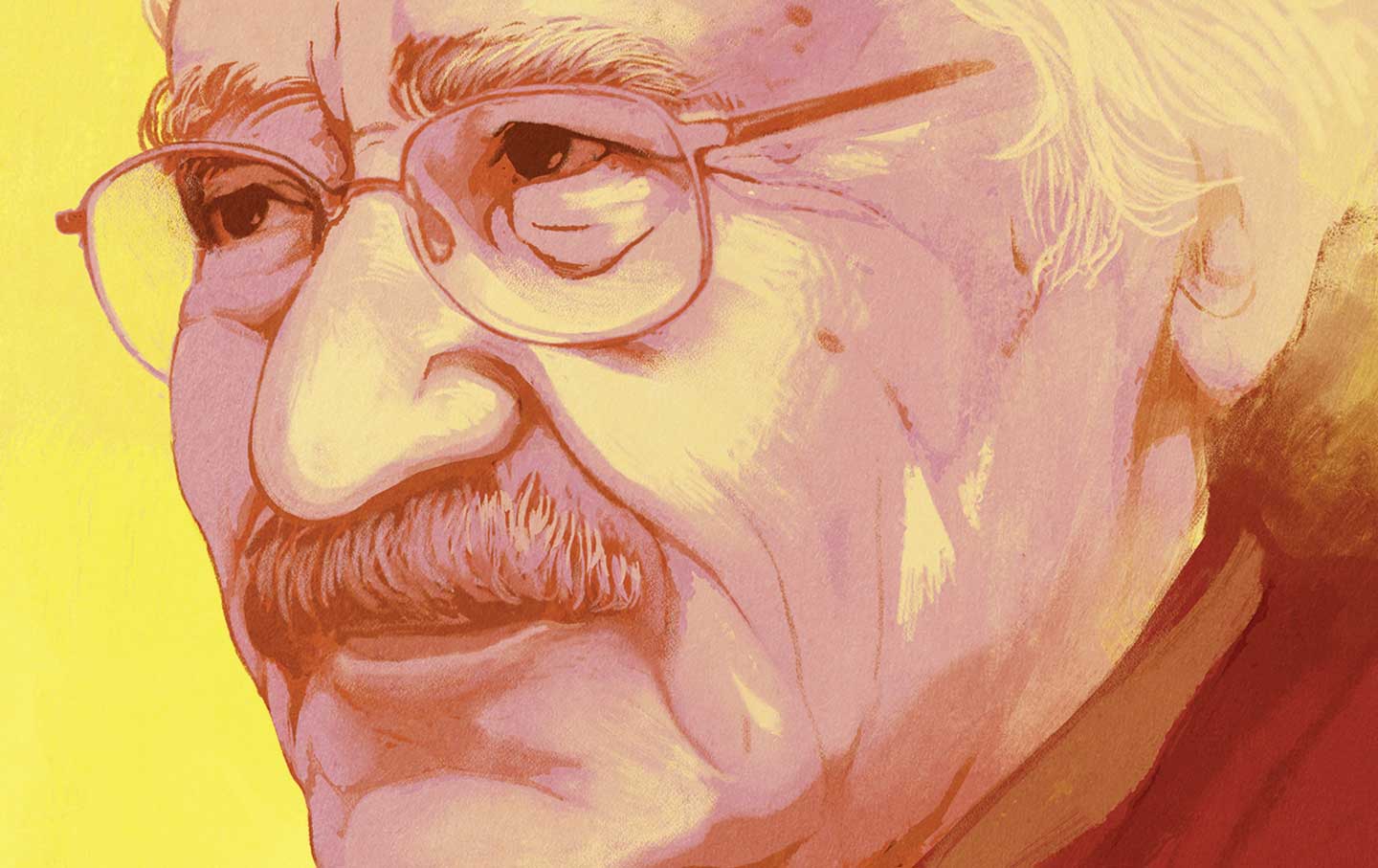
Gabriel García Márquez’s Last Lesson Gabriel García Márquez’s Last Lesson
His final novel, Until August, serves as not only a record of his last struggles with illness but also as a document of courage.


